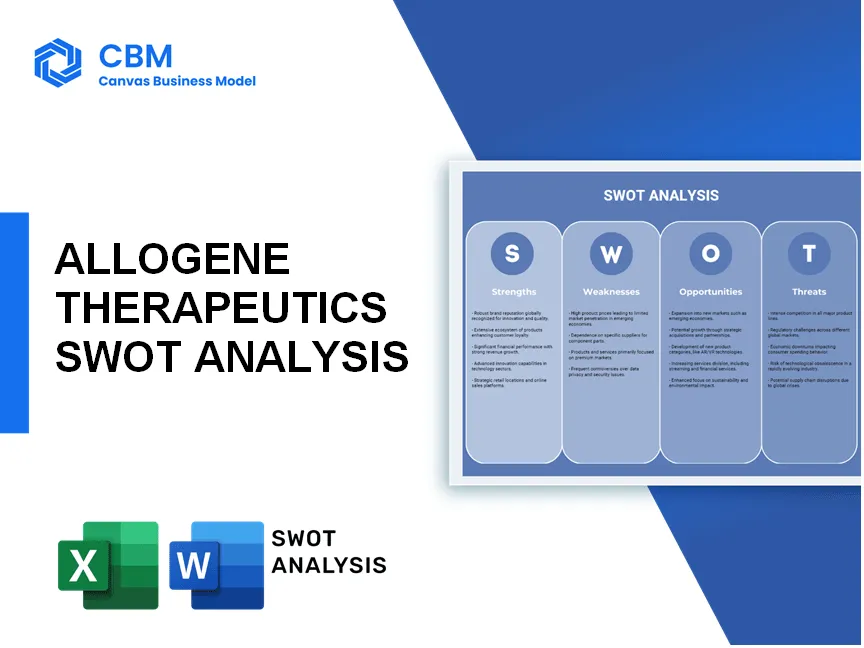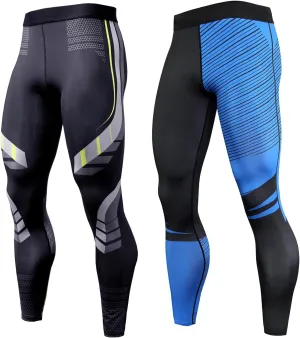In the rapidly evolving world of biotechnology, Allogene Therapeutics stands at the forefront of innovation with its revolutionary CAR T cell therapies aimed at combating cancer. Within this blog post, we will delve into a comprehensive SWOT analysis that sheds light on the strengths, weaknesses, opportunities, and threats facing the company. From its cutting-edge technology platform to the competitive landscape of the biotech sector, discover what positions Allogene for success and the challenges it must navigate on its path to transforming cancer treatment.
SWOT Analysis: Strengths
Strong focus on innovative CAR T cell therapy, positioning Allogene as a leader in the biotechnology space.
Allogene Therapeutics specializes in next-generation CAR T cell therapeutics. As of 2023, the company has reported advancements in their proprietary AlloCAR T therapies which leverage allogeneic donor cells, differentiating them from traditional patient-derived treatments.
Proprietary technology platform enables the development of off-the-shelf CAR T therapies, enhancing accessibility and patient treatment options.
The company has developed a unique platform allowing for the creation of off-the-shelf CAR T cells, which can significantly reduce the time needed for treatment commencement, creating better accessibility for patients. This innovation aims to bring CAR T therapies to a wider population, especially for those with urgent medical needs. For instance, the clinical trial results in 2022 indicated a 90% response rate in patients treated with their CD19-targeted therapy in hematological malignancies.
Robust pipeline of product candidates, addressing various hematologic malignancies and solid tumors.
Allogene has a diverse pipeline including multiple candidates targeting:
- A total of 5 investigational new drugs in clinical trials as of October 2023.
- A focus on both hematologic cancers such as Non-Hodgkin Lymphoma and solid tumors like lung cancer.
The company anticipates key data releases for important phase trials, with peak revenue estimates exceeding $1 billion for certain therapies once approved.
Experienced leadership team with backgrounds in biotechnology and pharmaceuticals, fostering strategic partnerships and collaborations.
Allogene's executive team comprises veterans from organizations such as Genentech and Gilead Sciences. The Chief Executive Officer, David Chang, previously led the development of pioneering therapies that generated over $4 billion in revenue.
The company has established strategic collaborations with prominent biotech firms, exemplified by its agreement with Stanford University focused on advancing research in CAR T cell therapies.
Strong intellectual property portfolio protecting core technologies and therapies.
As of late 2023, Allogene holds over 150 patents covering various aspects of CAR T cell engineering and manufacture. This robust IP portfolio ensures a competitive edge in the biotechnology landscape, safeguarding its innovative therapies and technologies against potential market entrants.
| Aspect | Details |
|---|---|
| Patents Held | Over 150 |
| Investigational New Drugs | 5 |
| Leadership Experience | Combined 75 years in biotech and pharma |
| Projected Peak Revenue Potential | $1 Billion |
| Response Rate in Trials | 90% |
| Prior Revenue Generation by CEO | $4 Billion |
[cbm_swot_top]
SWOT Analysis: Weaknesses
High research and development costs associated with bringing CAR T therapies to market.
The development of CAR T therapies involves substantial financial investment. In 2022, Allogene Therapeutics reported research and development expenses of approximately $136.6 million, reflecting the high costs associated with clinical trials, regulatory approvals, and manpower.
Dependence on the success of a limited number of key product candidates, which increases financial risk.
Allogene has centered its efforts primarily on several key product candidates, such as ALLO-501 and ALLO-715. As of 2023, these candidates are still in clinical development, and the overall financial outlook is heavily influenced by their outcomes. Should these candidates fail in clinical trials, it could lead to a significant loss, estimating a market cap reduction of roughly $350 million.
Limited market presence compared to larger, established competitors in the biotechnology sector.
As of 2023, Allogene’s market capitalization stands at approximately $1.1 billion, significantly smaller than competitors like Gilead Sciences, which boasts a market cap exceeding $24 billion. This limited presence restricts their bargaining power and impacts their ability to attract investors.
Potential complications and side effects associated with CAR T therapy may hinder adoption in some patient populations.
Reported adverse events related to CAR T therapies include cytokine release syndrome (CRS) and neurotoxicity. Data indicates that about 30% to 50% of patients experience CRS, leading to hesitance in adoption among certain oncologists, contributing to a slower market penetration than anticipated.
Ongoing regulatory challenges and uncertainties in the approval process for novel therapies.
Allogene continues to face significant regulatory obstacles. The approval process for novel therapies is notoriously rigorous; for instance, the FDA's average approval time can exceed 10 months for new biologics. As of 2023, Allogene has filed for several INDs, but delays in approvals can lead to significant financial repercussions, estimated to exceed $50 million in lost revenue opportunities per delayed product launch.
| Weaknesses | Details |
|---|---|
| Research and Development Costs | $136.6 million (2022) |
| Dependence on Key Products | Financial risk could lead to a $350 million reduction in market cap |
| Market Capitalization | $1.1 billion (2023) |
| Adverse Events in CAR T Therapy | 30% to 50% experience Cytokine Release Syndrome |
| Regulatory Approval Time | Average exceeds 10 months |
| Financial Loss from Delays | Estimated >$50 million in lost revenue |
SWOT Analysis: Opportunities
Growing demand for innovative cancer therapies and increasing investments in CAR T cell research.
The global CAR T cell therapy market was valued at approximately $3.1 billion in 2022 and is projected to grow at a compound annual growth rate (CAGR) of 30.4% from 2023 to 2030, reaching around $21.7 billion by 2030.
Potential for international expansion into emerging markets with high cancer prevalence.
The incidence of cancer in emerging markets such as India and China continues to rise, with an estimated 4.5 million new cancer cases expected in China alone in 2023. These markets present significant opportunities for Allogene Therapeutics as they expand their geographical reach.
Strategic collaborations and partnerships with pharmaceutical companies could enhance development efforts and market reach.
Allogene has entered various strategic partnerships, with notable collaborations including their agreement with Pfizer in 2021, which is valued up to $3 billion contingent on the development milestones of CAR T therapies.
Advances in genetic engineering and cellular therapies present opportunities for enhanced product development.
The market for gene editing technologies, which is below the CAR T cell therapy market, is expected to grow from $4.3 billion in 2022 to $11.2 billion by 2026, reflecting a CAGR of 17.1%. This growth supports potential innovations for Allogene's product development pipeline.
Expansion of the company's pipeline to include additional indications and combination therapies.
Allogene Therapeutics currently has three active clinical trials for CAR T therapies aimed at treating hematologic malignancies. Expanding the pipeline to address solid tumors and combination therapies could increase the market opportunity significantly, given the rise of combination therapies expected to account for 50% of the cancer treatment market by 2025.
| Opportunity | Market Value (2023) | Projected Growth (CAGR) | Target Market |
|---|---|---|---|
| CAR T Cell Therapy | $3.1 billion | 30.4% | Global |
| Gene Editing Technologies | $4.3 billion | 17.1% | Global |
| Potential Collaborations (Pfizer) | $3 billion | N/A | Global |
| Emerging Markets Cancer Cases | 4.5 million (China) | N/A | China |
| Combination Therapies Market | N/A | 50% by 2025 | Global |
SWOT Analysis: Threats
Intense competition from other biotechnology firms and research institutions developing CAR T and alternative therapies.
The CAR T-cell therapy market is growing rapidly, with numerous companies involved. According to a report from Grand View Research, the global CAR T-cell therapy market was valued at approximately $4.43 billion in 2021 and is expected to expand at a compound annual growth rate (CAGR) of 33.4% from 2022 to 2030. Key competitors include Bristol-Myers Squibb (Kymriah), Gilead Sciences (Yescarta), and Novartis, which have already launched substantial products.
As of 2023, there are more than 60 CAR T products in clinical trials, with several leading companies also developing next-generation therapies and alternatives, such as TCR (T-cell receptor) therapies.
Regulatory changes and evolving policies may impact the approval and commercialization of new therapies.
The biopharmaceutical industry is highly regulated. Recent shifts, particularly following the COVID-19 pandemic, have led to expedited approval pathways. However, changes in the regulatory environment could introduce greater challenges for approval processes, impacting commercialization timelines. The FDA’s Breakthrough Therapy designation, which was granted to 43 CAR T therapies as of 2022, is subject to modification depending on evolving policies. Increased scrutiny on efficacy, safety, and post-market surveillance may also arise.
Market acceptance challenges due to misconceptions or lack of awareness about CAR T therapies among healthcare providers and patients.
Despite the effectiveness of CAR T therapies, misconceptions persist. A survey conducted by the American Society of Clinical Oncology (ASCO) indicated that only 45% of oncologists felt confident in discussing CAR T therapy with their patients, which can affect patient uptake. Furthermore, the challenges mean that even with FDA approvals, the market penetration may lag. Approximately 53% of the surveyed patients were unaware of CAR T therapies as a treatment option, indicating significant educational gaps.
Pricing pressures from healthcare systems and insurance providers may affect profitability.
The high cost of CAR T therapies, which can range from $373,000 to over $700,000 per patient, poses significant challenges. In 2022, the Centers for Medicare and Medicaid Services (CMS) approved Medicaid reimbursement for CAR T therapy, but negotiations with private payers remain complex. Continued pressure to reduce costs can trigger price reductions impacting Allogene's profitability, especially as competition increases in the field.
Economic downturns could lead to reduced funding for research and limited access to capital for growth.
Economic factors such as inflation and recession concerns can significantly affect funding for biotechnology companies. In 2022, venture capital funding for biotech firms saw a decline of 30% year-over-year, totaling approximately $19 billion across all groups. Moreover, interest rates have increased, leading to higher borrowing costs, which could limit Allogene's ability to secure capital for research and development. Market volatility may deter investors, impacting the projected financial outlooks for development pipelines.
| Threat Factor | Impact | Market Data |
|---|---|---|
| Competition | High | CAR T market projected to reach $24.12 billion by 2030 |
| Regulatory Changes | Medium | 43 Breakthrough Therapy designations granted |
| Market Acceptance | High | 45% of oncologists confident discussing CAR T |
| Pricing Pressures | High | Costs range from $373,000 to $700,000 |
| Economic Downturns | High | Venture capital funding down 30% in 2022 |
In summary, Allogene Therapeutics stands at a pivotal junction within the ever-evolving landscape of oncology, driven by its innovative CAR T therapy. With a robust pipeline and a commitment to enhancing patient outcomes, the company is well-positioned to capitalize on emerging opportunities, despite facing considerable challenges. By leveraging its strengths and navigating its weaknesses, Allogene can endeavor to solidify its competitive edge and potentially transform the future of cancer treatment.
[cbm_swot_bottom]



![Sea-Dog Triple Threat Rod Holder Surface Mount - Base Only [325472-1] Sea-Dog Triple Threat Rod Holder Surface Mount - Base Only [325472-1]](https://www.durablebag.shop/image/sea-dog-triple-threat-rod-holder-surface-mount-base-only-325472-1_DabHwk_300x.webp)








